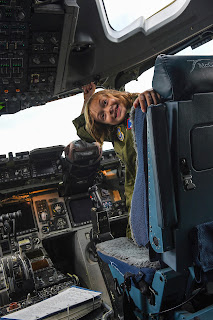New USU Course Focuses on Mental Health of Military Children
The Uniformed Services University's Graduate School of Nursing developed a new course, Child and Adolescent Mental Health, to address the mental health needs of military children in medicine.
April 25th, 2023 by Ian Neligh
Military families face a host of challenges such as frequent moves, periods of separation, and deployments, which can all have an impact on children and adolescents. A newly-refined course developed by the Uniformed Services University (USU) Daniel K. Inouye Graduate School of Nursing (GSN) was created specifically with the mental health needs of military children in mind.
Air Force Lt. Col. Regina Owen, program director for the university’s Psychiatric Mental Health Nurse Practitioner program, (PMHNP) developed the course, Child and Adolescent Mental Health, and first rolled it out for students last year before further refining it for this year’s curriculum.
 |
A military child participates in the Joint Base Lewis-McChord (JBLM) Pilot for a Day program. (Photo by U.S. Air Force Airman 1st Class Mikayla Heineck) |
“There are identified mental health disorders that commonly occur in this population” Owen says. “This course is designed to focus on evidence-based treatments for depression, anxiety, ADHD and behavioral problems.”
Owen says military children sometimes experience multiple stressors when a parent is deployed, which she said is a challenging role in a military family unit. Understanding how to cope with the psychological consequences of increased stressors and traumatic events like COVID-19, in part, prompted the course’s creation.
“Knowing that military children and their families were having such a difficult time, just like non-military families, it was a prime opportunity to add this course to our curriculum and share this knowledge with all healthcare providers,” Owen says, adding another part of the inspiration behind the course’s creation came from feedback of the graduating students.
Owen says over the years the PMHNP graduates had requested a specific course dedicated to addressing pediatric mental health and the unique military issues confronted by military children and their families.
“How are we ensuring that children continue to be heard? I think that is the biggest part — adults sometimes have a hard time understanding this unique situation these military children are in,” Owen says. “They are not able to articulate everything that they feel. So we have to stop, listen and help them.”
Owen described the new course as an intense six-weeks focusing on depression, anxiety, ADHD, and behavioral problems which, she says, are the most common mental health diagnoses of children across the board.
Army Maj. Kimberley Maggio took the first iteration of the course last summer as a student in the Psychiatric Mental Health Nurse Practitioner program.
“So much is happening in the life of a child and adolescent that creates a lasting impact into their future,” Maggio says. “I’ve never really had an in-depth course on the mental health of this population, so I was thankful I had the opportunity.”
Maggio says she thought the course layout did a fabulous job of breaking down each lesson and its application to the real world.
“From a general mental health perspective, so much is happening in a child’s life during this time that develops who they are and how they see the world,” Maggio says. “…The military child is placed in a unique position, unlike any of their peers in this specialty. The transient and versatile aspects of their lives mean they experience their upbringing a little differently than most.”
According to Maggio, providers owe it to the children to be knowledgeable and understanding of their specific needs.
“They play a crucial part in the life of service members and their care is a priority,” Maggio says.
Air Force Maj. Anna Crane, who also took the course, said from a military perspective, she believes a significant part of service members’ military success and mission readiness includes their physical, mental, and emotional well-being and that of their children.
“It is noteworthy to point out that a service member may find it difficult to focus on military duties or maintain mission readiness if there is little or no support for child and adolescent mental health,” she says. Crane adds that providing appropriate mental health interventions and support for children is paramount.
Crane says the Child and Adolescent Mental Health course provided a foundation that allowed her a deeper understanding of how developmental stages may affect mental health, and what communication skills are effective when engaging with children and adolescents.
According to Owen, the biggest issue regarding military child mental health is helping parents learn how to support their child and taking a moment to recognize their strengths.
“It is hard. Everyone is busy, but children just need a minute of your time. That’s really what’s hard for some people. To stop and see it through their lens,” Owen says. “Just be present with your child when there are things that are difficult, or challenging, and be present there — not just in body, but in mind, too.”
A number of helpful resources are available, including www.militaryonesource.mil and https://militarykidsconnect.health.mil.





